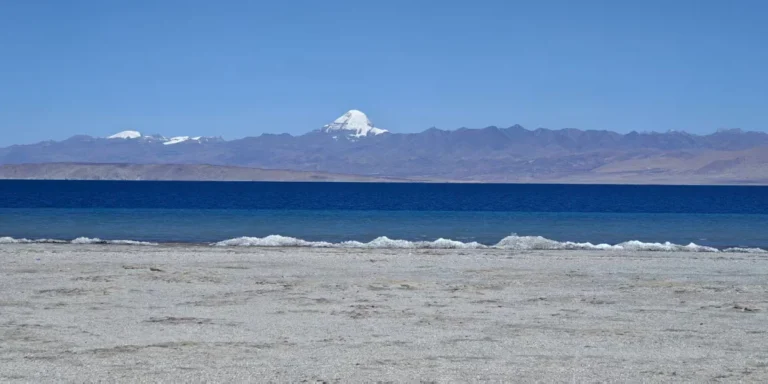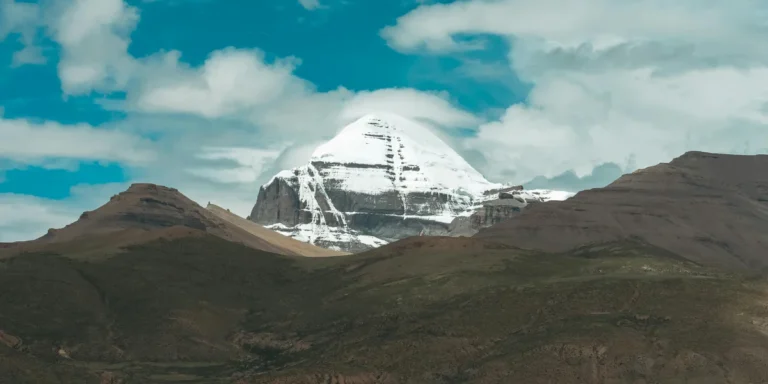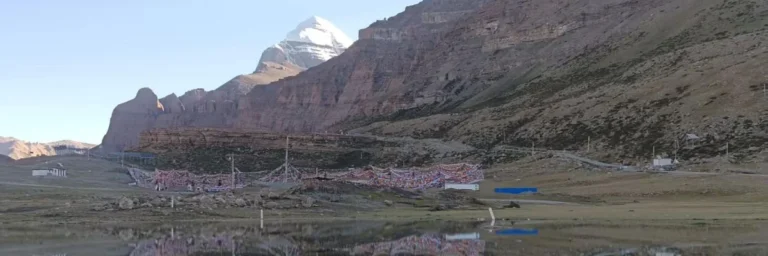Introduction to Food to Eat at Everest Base Camp Trek
The Everest Base Camp Trek is one of the most famous adventures in the world. It actually attracts many trekkers every year. With its amazing landscapes and challenging trails, it’s a journey that requires both physical endurance and mental strength.
One very important aspect of preparing for this trek is understanding the importance of proper nutrition. The high-altitude environment can put extra stress on your body. This can make it very important to fuel yourself with the right foods.
In this guide, we will explore the various food to eat at Everest Base Camp trek in Nepal. From good breakfasts to energizing snacks, discover what foods to eat to make sure of a successful adventure to the EBC.
Table of Contents
Breakfast Options at Everest Base Camp
Breakfast is a very important meal of the day. It is especially true when you are in a remote place on earth working out to reach the Everest Base Camp. The breakfast will be setting the tone for a day filled with physical exertion. Tea houses along the route provide a variety of breakfast choices that match the different tastes and nutritional needs for our trekkers.
Some popular food to eat at Everest Base Camp trek in Nepal for breakfast options include:
- Tibetan Bread: It is a type of flatbread that is soft and slightly chewy. It is enjoyed with butter or jam.
- Chapatti: It is another form of flatbread, usually served with honey or jam.
- Toast with Jam or Honey: Simple yet effective, it provides quick energy through easily digestible carbohydrates.
- French Toast: Typically served with syrup or fruit, providing a sweet start to the day.
- Pancakes: Available with various toppings like fruits or syrup, perfect for those craving something sweet and filling.
- Porridge with Milk: A hearty option that provides sustained energy through complex carbohydrates and protein from milk.
- Boiled or Fried Eggs: Rich in protein, aiding muscle recovery and keeping you full longer.
Nutritional Benefits
Having a good breakfast before heading on the trek is actually very important. It replenishes glycogen stores depleted overnight and provides the necessary energy to tackle the demanding terrain ahead. Complex carbohydrates found in porridge and Tibetan bread release energy slowly, ensuring sustained endurance. Protein from eggs aids in muscle repair, while fats from butter or jam help maintain long-lasting energy levels.
A well-rounded breakfast can make a great difference in your trekking performance and overall well-being during this challenging adventure.
Lunch and Dinner Choices During the Trek
After a long day of trekking, it is important to have a good and substantial meals to restore energy. The Everest Base Camp trek provides good food to eat at Everest Base Camp trek in Nepal with a variety of nutritious lunch and dinner options.
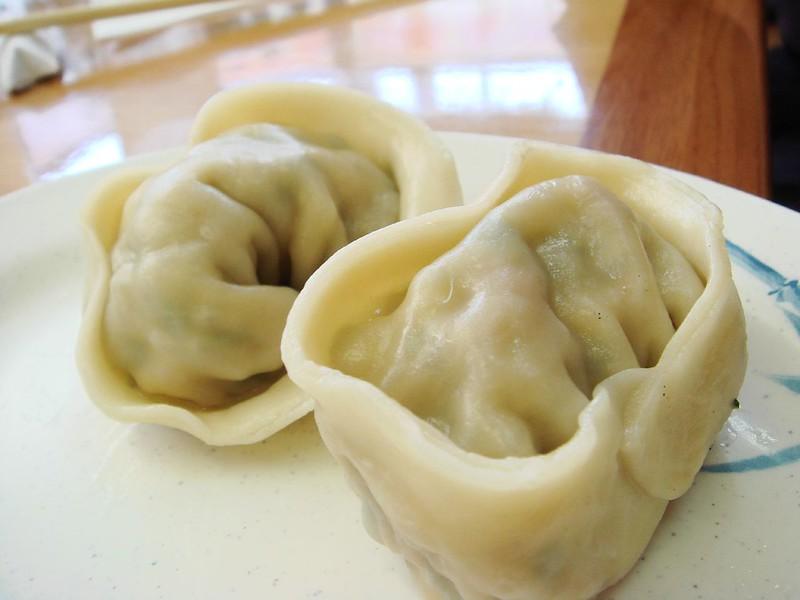
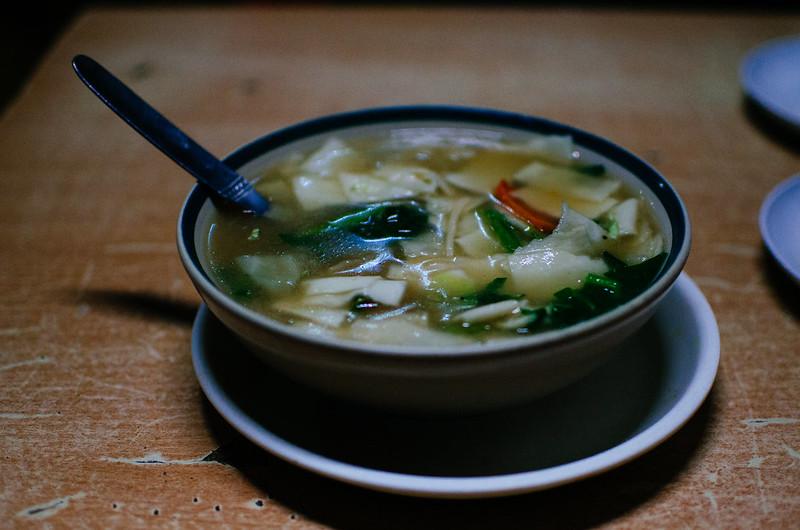
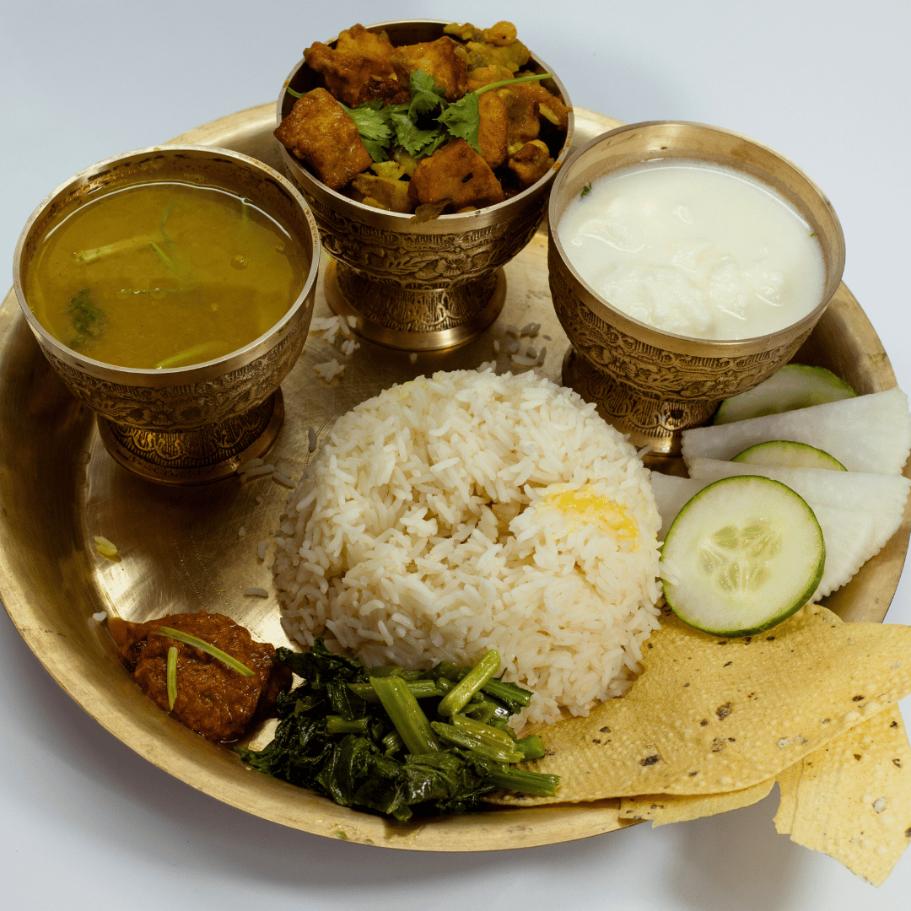
Popular Lunch and Dinner Options
- Dal Bhat (lentil soup with rice): This popular dish is a favorite among trekkers for its balanced nutrition. Dal Bhat provides carbohydrates from rice, protein from lentils, and vitamins from accompanying vegetables.
- Momos (dumplings): These can be filled with vegetables or meat. Momos are steamed or fried, making them versatile and flavorful.It is another very popular meal here in Nepal.
- Thukpa (noodle soup): A comforting option that includes mixed vegetables and sometimes meat. Thukpa’s warm broth helps to maintain hydration levels at high altitudes.
- Pasta Dishes: Various pasta dishes such as spaghetti and macaroni are available. These meals offer a good source of carbohydrates for sustained energy.
- Sherpa Stew (Syakpa): A nutritious meal, Sherpa stew typically contains meat, potatoes, and vegetables in a thick broth, providing both warmth and nourishment.
- International Cuisines: Many tea houses also cater to Western tastes with options like pizza, sandwiches, and burgers. These familiar foods can be comforting for those missing home flavors.
Trekkers can enjoy these food to eat at Everest Base Camp trek in Nepal while making sure that they receive the necessary nutrients to tackle the challenging terrain ahead.
Snacks to Keep You Energized on the Trail
Snacks are also very important for keeping your energy up during the Everest Base Camp Trek. It is especially important when dealing with steep climbs and long walks. Having quick snacks can help you stay energized between meals, making sure that you are ready for each part of your journey.
Here are some common snack choices that provide quick energy boosts:
- Trail Mix: A combination of nuts, dried fruits, and sometimes chocolate pieces, offering a good mix of carbohydrates, proteins, and fats.
- Energy Bars: Compact and nutrient-dense, these bars come in various flavors and are designed to provide instant energy.
- Snickers Bars: Popular among trekkers for their mix of chocolate, caramel, and peanuts.
Including snacks like these in your trekking plan can actually enhance your performance and enjoyment on the trail.
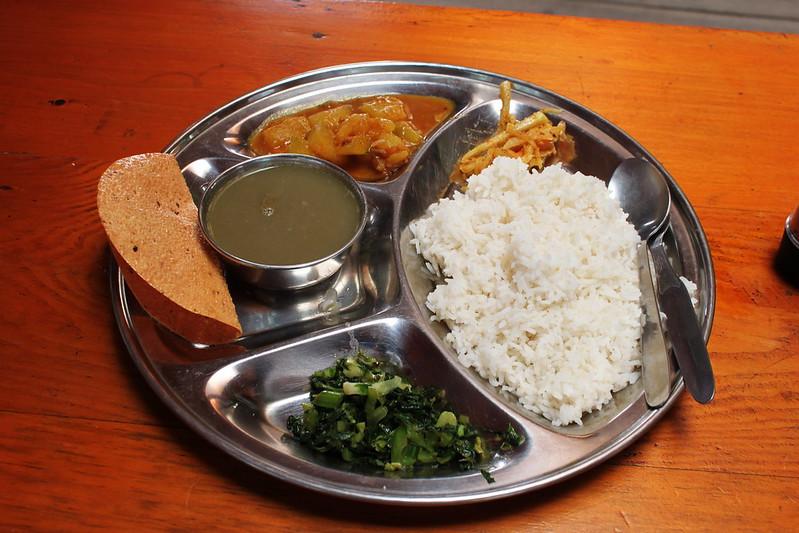
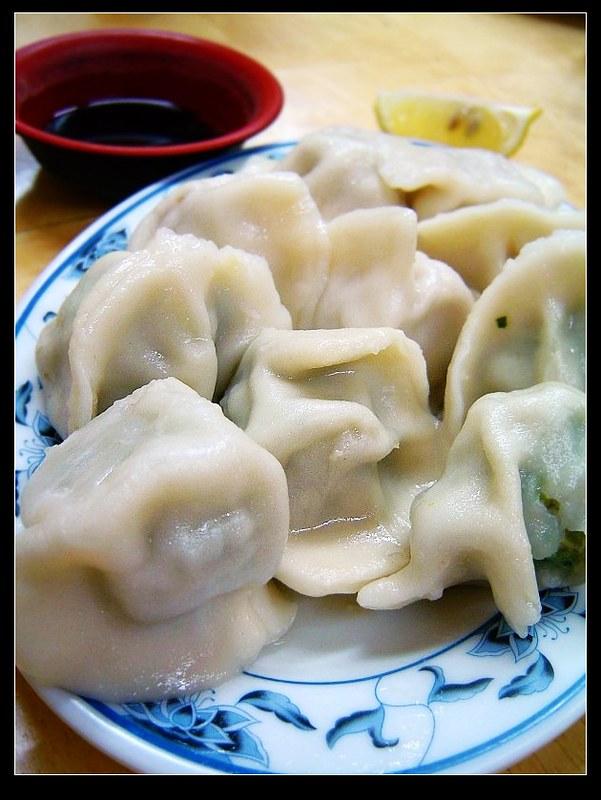
Dietary Considerations for Trekkers with Specific Needs
Trekkers with dietary needs will find the Everest Base Camp trek accommodating with various different food to eat at Everest Base Camp trek particularly for vegetarians. Many tea houses offer a variety of vegetarian options such as:
- Dal Bhat (lentil soup with rice and vegetables)
- Vegetarian momos
- Thukpa with vegetables
- Pasta dishes without meat
Eating a balanced diet is extremely important. Carbohydrates are the main source of energy, which is necessary for daily trekking activities. Foods like rice, bread, and pasta are great sources of carbohydrates. Protein is also important for muscle recovery; options include lentils, beans, eggs, and dairy products.
Making sure meals food to eat at Everest Base Camp trek have a mix of carbohydrates and protein helps keep energy levels up and helps in recovery after tough trekking days. Planning meals thoughtfully can make the trekking experience better by keeping energy levels steady and supporting overall well-being.
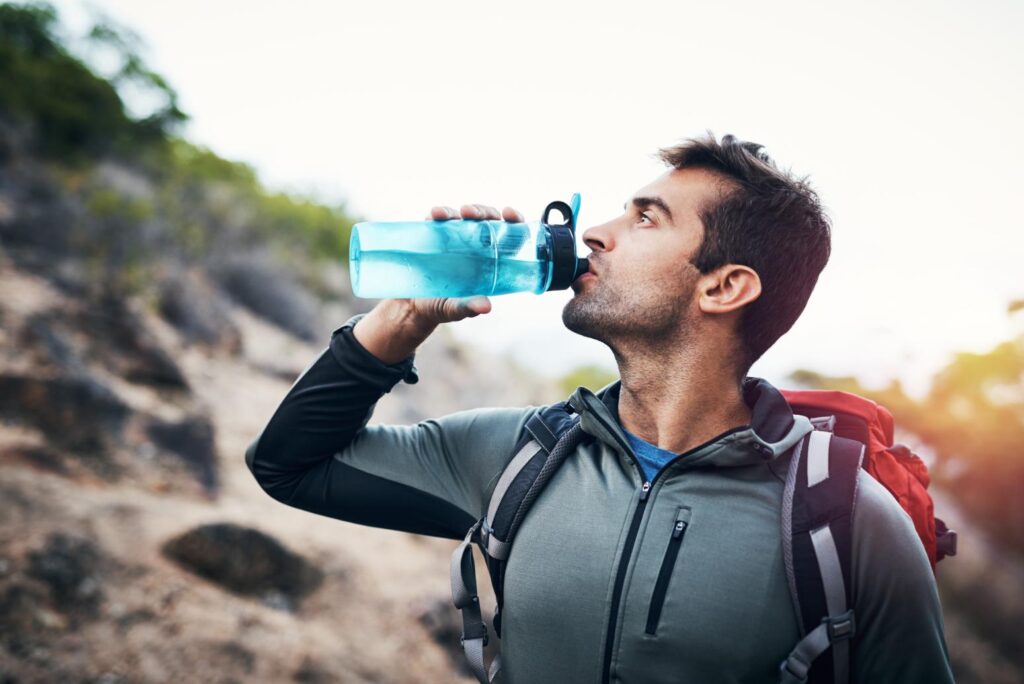
Staying Hydrated at High Altitudes: Tips for Trekkers
Hydration is also a major thing for successfully completing the Everest Base Camp Trek. At high altitudes, the body loses water more quickly due to increased breathing and sweating, so it is very important to drink enough fluids.
How to Purify Water
Trekkers have several options to make sure that their drinking water is safe:
- Boiling: One of the most effective methods. Boiling water for at least three minutes kills most pathogens.
- Water Purification Tablets: These are lightweight and easy to carry. Chlorine dioxide tablets are popular choices.
- Portable Water Filters: Devices like the Sawyer Mini or LifeStraw offer a convenient way to filter water directly from streams or taps.


Cost Considerations
While bottled water is available along the trek, it can be expensive as you go higher. Prices increase significantly due to transportation challenges. For example:
- At lower altitudes, a liter of bottled water may cost around $1-$2.
- Near Everest Base Camp, the price can soar to $4-$5 per liter.
Using purification methods not only saves money but also reduces plastic waste, helping protect this beautiful region’s environment.
Staying hydrated helps in acclimatization and reduces symptoms of altitude sickness. This will make sure of a safer trekking experience.
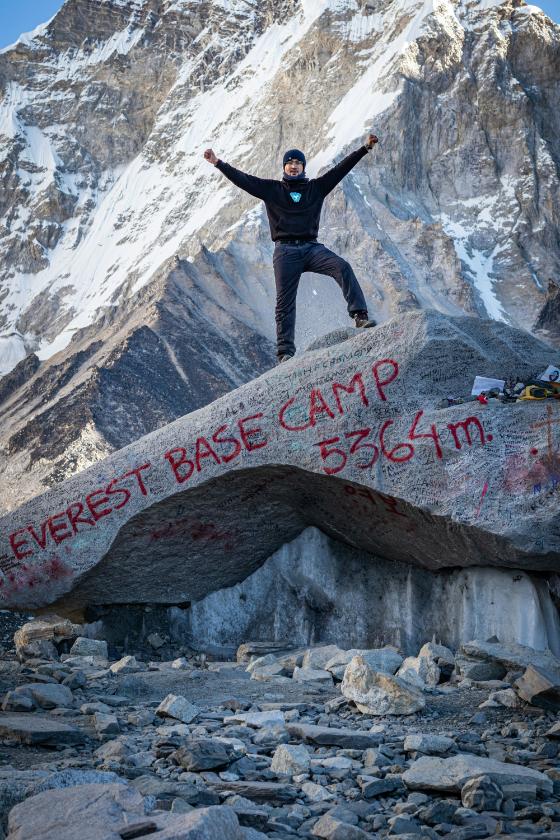
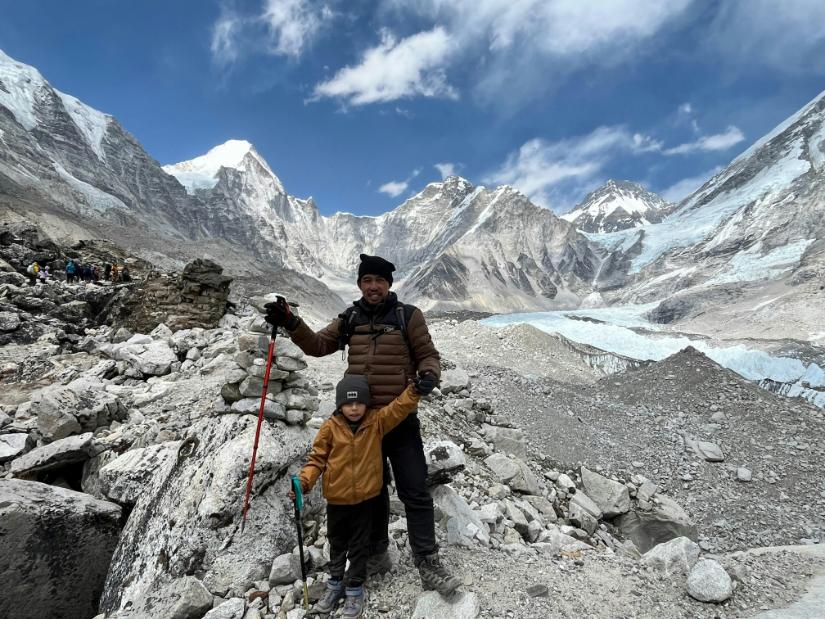
Foods to Avoid While Trekking in Nepal’s Himalayas
When talking about the right food to eat at Everest Base Camp trek, one should also note that high altitudes can be tough on your digestive system, so it is important to watch what you eat. Some foods can make dehydration worse or upset your stomach, which could ruin your trekking adventure.
Foods to Avoid:
- Alcohol: Drinking alcohol can dehydrate you, which is a big problem at high altitudes where staying hydrated is crucial.
- Caffeine: Even though it might be tempting, caffeine can also dehydrate you and mess up your sleep schedule, which is important for recovery.
- Heavy Meats: Red meats and other heavy proteins might cause stomach issues because the lower oxygen levels affect digestion.
- Dairy Products: Some trekkers find that dairy products like milk and cheese make them feel bloated or give them an upset stomach at higher elevations.
Recommendations:
Trekkers should focus on eating foods that are easy to digest and help with hydration and energy levels. It is generally advised to stick with local dishes, as they are usually made with these things in mind, when deciding what to eat during the Everest Base Camp Trek.
Planning Your Meals Wisely for the EBC Adventure!
Smart meal planning is again very important for an enjoyable trekking experience. Consider your personal preferences and dietary requirements, when it comes to properly intaking of the food to eat at Everest Base Camp trek. While enjoying the local cuisine options such as Dal Bhat, momos, and Sherpa stew available along the route. This approach makes sure that you remain energized and well-nourished throughout your journey.
By strategically choosing meals that balance carbohydrates, proteins, and healthy fats, you can maintain optimal energy levels and support muscle recovery during the trek. Bon appétit and happy trekking!
FAQs (Frequently Asked Questions)
You may also like:
Send an Enquiry
Error: Contact form not found.
© 2026 - Himalayan Trekking and Tours (P) Ltd. All Rights Reserved.


